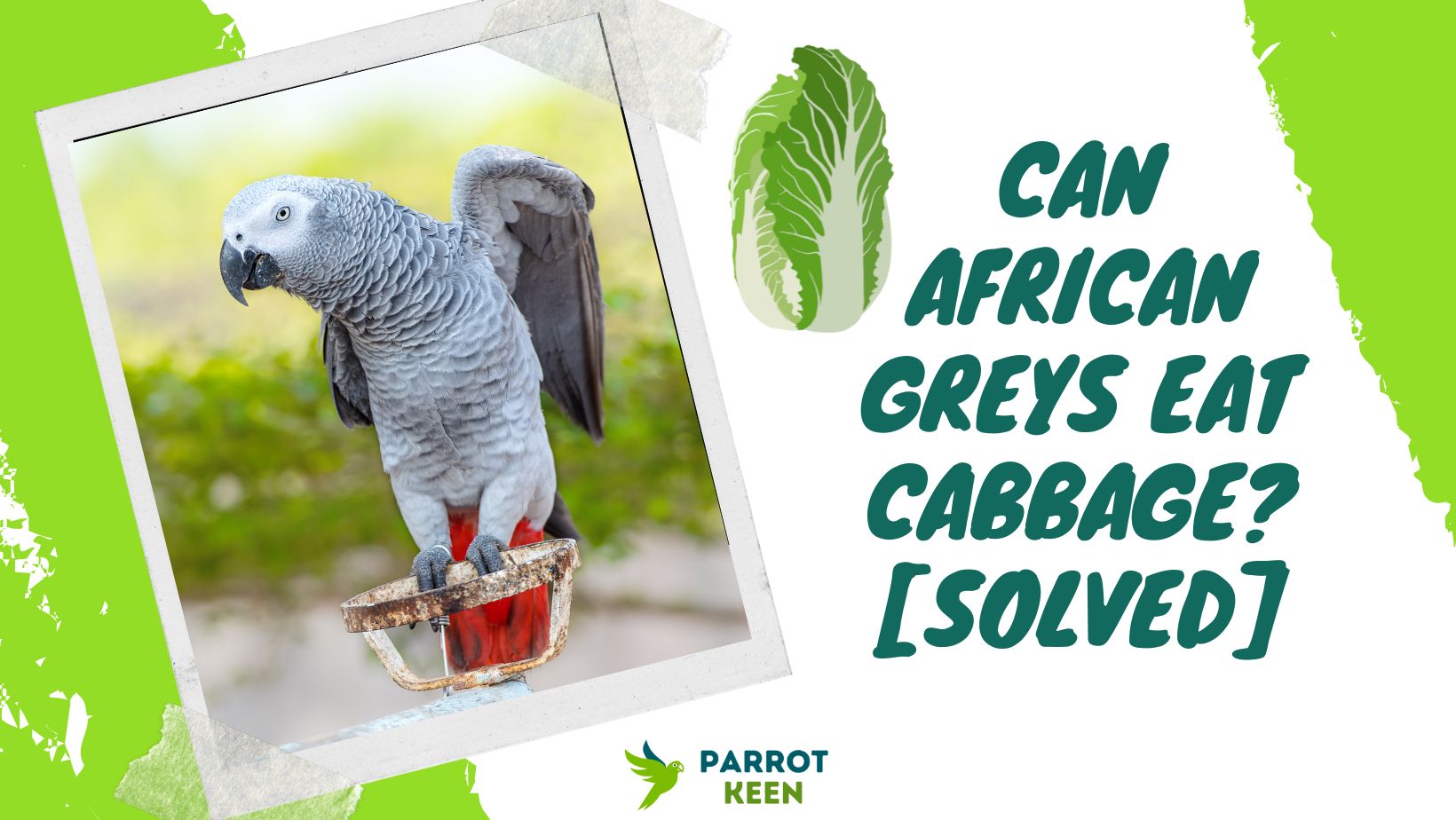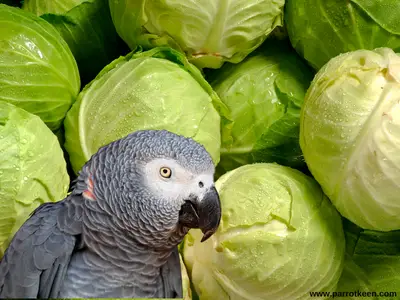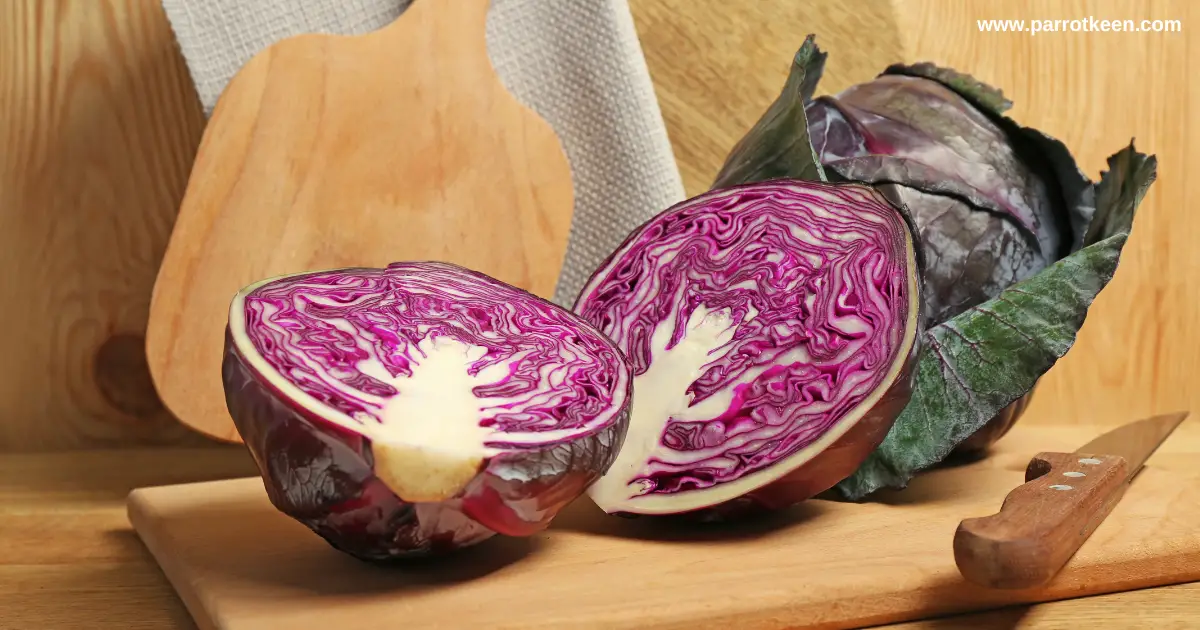
Can African Greys Eat Cabbage? [Answered]
Cabbage is a cruciferous vegetable, and, like all cruciferous vegetables, it is packed with nutrients that are beneficial for humans. As you know, many healthy greens are good for us, not healthy for birds.
Most bird owners are familiar with the fact that their birds cannot eat certain foods. But what about African greys? Can they eat cabbage? And if so, is it a good idea?
In this blog post, we’ll look at the question of whether or not African greys can eat cabbage and explore the pros and cons of doing so. So, without further ado, let’s get started!
Can African Greys eat cabbage? The answer is yes! Cabbage is a healthy and safe food for African Greys. Both raw and cooked forms of cabbage are acceptable for these birds to eat.
Many African Greys enjoy munching on cabbage leaves. So if you’re looking for a way to add some variety to your bird’s diet, don’t be afraid to give them some cabbage to try!
Now, let’s talk about the nutritional value of cabbage for African Greys. Does it matter the variety of cabbage?
Keep reading.

What Are the Nutritional Benefits of Cabbage For African Greys?
Cabbage is a nutrient-rich vegetable that can be beneficial for African Greys. Here are some benefits why we think you should incorporate cabbage into your bird’s diet:
-
Good source of Vitamin C and K
Cabbage is an excellent source of both Vitamin C and Vitamin K. Vitamin C is essential for a healthy immune system, while Vitamin K helps to promote proper blood clotting.
-
Potassium
This leafy vegetable is an excellent source of potassium, which is essential for maintaining healthy blood pressure levels. Potassium also helps to regulate fluid balance in the body and supports nerve function.
-
Calcium
This vegetable is a powerhouse of nutrients, including calcium. Calcium is important for strong bones and teeth and can help prevent health conditions such as osteoporosis.
African Greys require a diet high in calcium, and cabbage is an excellent source of this essential nutrient.
A calcium deficiency can lead to health problems such as weakness, trembling, and paralysis.
-
Manganese and Magnesium
For African Greys, cabbage is an excellent source of manganese and magnesium. Manganese is essential for healthy bones and joints, and it also helps the body to produce energy. Magnesium is necessary for proper muscle function and relaxation.
-
Dietary Fiber
Cabbage is a leafy green vegetable that is high in dietary fiber. This means it can help keep your African grey’s digestive system healthy and functioning properly.
Additionally, the high fiber content of cabbage can help reduce the risk of obesity and other weight-related health problems.
Can African Grey Eat Purple Cabbage?

Yes, African Greys can eat purple cabbage. When it comes to purple cabbage, many parrots enjoy the taste and texture.
In addition to being a tasty treat, purple cabbage is also packed with nutrients essential for a healthy diet.
Some of the purple cabbage’s many vitamins and minerals include vitamins A, C, calcium, and iron. As a result, purple cabbage can be a great way to help your parrot get the nutrients they need.
Raw or Cooked cabbage: Which Is Better for African Greys?
When it comes to cabbage, there is some debate over whether raw or cooked is best for parrots. Some experts believe that raw cabbage is more nutritious, as cooking can destroy some vitamins and minerals.
However, cooked cabbage is easier for African grey parrots to digest and may be less likely to cause gastrointestinal issues.
It is important to know that vitamins B and C are the two vitamins that get hit the hardest when veggies are cooked.
Also, vitamins A, D, and K are better when not overcooked as well. So, it’s important not to cook the cabbage too much if you plan on feeding it to your African grey.
Ultimately, the decision of whether to give raw or cooked cabbage to your parrot should be based on what your bird prefers, what it needs the most, and what seems to agree with its stomach.
Generally, it is best to offer your parrot raw cabbage sometimes and cooked cabbage other times so that your bird gets a variety of nutrients and has the opportunity to try different textures.
Canned or Frozen Cabbage?
Canned or frozen cabbage is not recommended for African Greys. These types of cabbage are often high in sodium and other additives that can be harmful to your bird. Instead, opt for fresh cabbage whenever possible.
If you feed your African grey canned or frozen cabbage, ensure to rinse it thoroughly to remove as much sodium and other additives as possible.
What Types of Cabbage Can my African Grey Eat?
When it comes to finding the right type of cabbage for your African Grey, there are a few things to keep in mind.
First, there are over 400 varieties of cabbage to choose from, so it’s important to do some research and consult with your vet to find the best option for your bird.
Second, trying different types of cabbage to see which your bird loves the most is crucial.
And third, remember that fresh is always best! Cabbage is an excellent source of nutrients for African Greys, so be sure to include it in your bird’s diet.
Can I Feed A Cabbage Roll to My Parrot?
Cabbage rolls are a traditional dish that many people enjoy. Still, it is not advisable to feed them to your parrot.
Most cabbage rolls contain ingredients like tomato sauce, salt, sugar, and seasonings that are not healthy for your parrot. The intervention of these substances can cause health problems for your feathered friend.
The cabbage itself is safe, but the ingredients used to make the cabbage rolls are not. So, avoiding feeding cabbage rolls to your parrot is best.
However, some people might still go ahead and do it anyway. Ensure you closely monitor your parrot’s health if you decide to feed them cabbage rolls.
If you want to treat your parrot to something special, many safe and healthy options are available that will be much better for them than cabbage rolls.
When Should I Avoid Giving Cabbage to African Greys?
There are certain times when it is best to avoid feeding cabbage to birds. For example, if the cabbage is wilted or beginning to rot, it could make the birds sick.
In addition, if the cabbage has been treated with pesticides or herbicides, it could be poisonous to the birds. Therefore, it is important to use caution when feeding cabbage to birds.
If in doubt, it is always best to err on the side of caution and refrain from giving them this vegetable.
Side Effects Of Too Much Cabbage For Parrots.
It is recommended and advised that you feed cabbages to your parrots in moderation. Though it is often considered a healthy food, there are some potential side effects of cabbage for parrots.
Cabbage has some oxalic acid, which can bind with calcium and prevent birds from Absorbing it properly. Over time, this can lead to health problems, including weak bones and kidney stones.
In addition, if your parrot consumes cabbage that is poisoned or pesticides, it could get very sick or even die. Therefore, it is important to use caution when feeding cabbage to your parrot.
When feeding cabbage to your bird, always offer other calcium-rich foods to help offset the potential adverse effects.
How Can I Serve Cabbage to My African Grey?
When serving cabbage to your African Grey, it is important to chop it into small pieces to prevent choking for younger parrots. You can also steam the cabbage to soften it up, which makes it easier for your bird to eat.
Cabbage can be served as a stand-alone treat or mixed with other foods to create a more balanced meal. Either way, your bird will surely enjoy this delicious and nutritious treat.
Conclusion: Can African Greys Eat Cabbage?
African greys are omnivorous birds and can eat various foods, including cabbage. However, providing your bird with a balanced diet is vital to ensure that they receive the nutrients they need.
Cabbage is a healthy vegetable with many beneficial vitamins and minerals, so you can feel confident feeding it to your bird.
Have you ever fed these green veggies to your parrot? What was its reaction? Let us know in the comment section below.
Please don’t forget to share this post with other African Grey parents to help them too.

Hi, I am Thersa and Welcome to ParrotKeen, your number one place to get all the information you need about your cute parrot. I hope You Find it useful.
